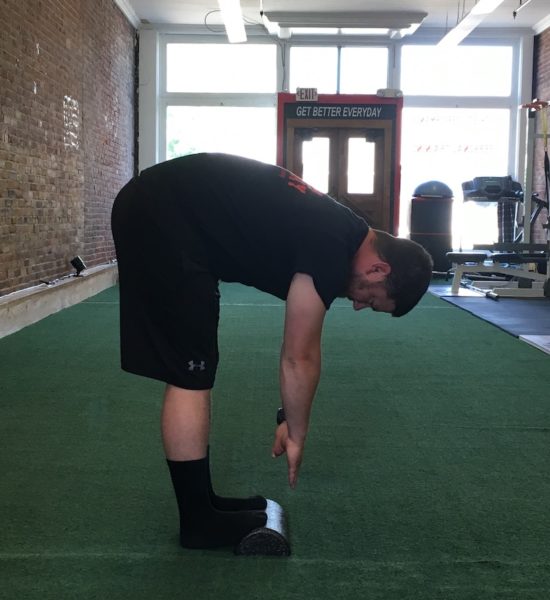It was 1:30 in the morning. I woke up and knew I was in trouble. My body wanted to go back to sleep, but my brain had other ideas. I tried deep breathing, meditating, reading. Two hours passed before I finally started to feel sleepy again.
Whenever this happens, I always check to see if there’s a full moon. Nine times out of 10 there is and sure enough, on that particular night, it was shining full and bright. Does anyone else blame their insomnia on the moon? The other time I don’t sleep well is when I’ve had a cup of black coffee late in the afternoon.
Andy Wight, my strength coach, told me that when he can’t get back to sleep, he often does what he calls the insomnia stretch. I asked him to demonstrate and tell me why he thinks it works.
He showed me two versions. Here’s a short video of the simpler stretch. Pretty self-explanatory. Keep your feet flat on the floor and bend over at the waist.
For the other stretch, elevate your toes about two inches. In the photo below, Andy is using a half foam roller, but he says anything will work.
Once you elevate the toes, that increases the tension on the fascia — you get more of a fascial stretch. The fascia is the white tissue that wraps all of the muscles together. It goes from the base of your toes to the base of your skull. With the toes elevated, you have a more limited range of motion because the fascia is stretching throughout the whole body. It gives you a little bit more a total body stretch than when you keep your feet flat on the floor. With your feet flat you will get a little bit more stretch through the belly of the muscle.
Andy’s best advice is to do whichever stretch feels best to you. And don’t just use them for sleepless nights. They both feel really good at any time of night or day. If you have trouble sleeping, I have some more advice in my blog post: Insomnia? Don’t eat or drink these before bed. Yes, it includes coffee!
You can also listen to the podcast I did with Dr. Christopher Hughes. He’s a neurologist and sleep specialist and medical director of the Center for Sleep Disorders at Southern Maine Health Care. Sweet dreams.



Leave A Comment